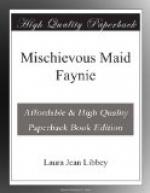It was beyond human power to look into those beautiful violet eyes, drowned in the most agonized tears, and the white, terrified, anxious face, without yielding to her prayer.
“I do not know what good reason you may have for binding us to secrecy,” he said, slowly and reluctantly, “but we cannot choose but to give you the promise—nay, the pledge—you plead for. I can answer for my Mary as well as myself—the story of to-night’s happenings shall never pass our lips until you give us leave to speak.”
“Thank you! Oh, I thank you a thousand times!” sobbed the girl. “You have lifted a terrible load from my heart. If the time ever comes when I can repay you, rest assured it shall surely be done.”
She tried to rise from her couch, but the good wife held her back upon her pillow with a detaining hand, exclaiming:
“What are you about to do, my dear child?”
“Go away from here,” sobbed the girl, again attempting to arise from the couch, but falling back upon the pillow from sheer weakness.
She did not leave that couch for many a day. What she had undergone had been too much for her shattered nerves.
Brain fever threatened the hapless girl, but was warded off by the faithful nursing of old Adam’s faithful wife.
And during those weeks the good woman could learn nothing of the history of the beautiful young stranger, who persistently refused to divulge one word concerning herself. She would turn her face to the wall and weep so violently when any allusion was made to her past that the grave digger’s wife gave up questioning her.
One morning the bed was empty. It had not been slept in. The girl had fled in the night.
Who she was, or where she had gone, was to them the darkest, deepest mystery. Would it ever be revealed? They could not discuss it with the old minister or any of the neighbors, for their lips were sealed in eternal silence concerning the matter.
“I feel sure the end of this matter is not yet,” said old Adam, prophetically. “When the girl comes face to face with the dastardly villain she wedded that night, it will end in a tragedy.”
“God forbid!” murmured his wife with a shudder; but down in her own heart she felt that her husband had spoken the truth; the tragic end of this affair had not yet come.
CHAPTER XI.
“You are disinherited—everything in this house is mine.”
Faynie had indeed departed from that humble home as she had entered it, in the dark, dim silence of the bitter-cold night.
She made her way as best she could to the station which, fortunately enough, was not far distant. The station master was old and anxious to get home, and therefore paid little heed to the little dark-robed figure who bought a ticket to New York, and soon after crept silently aboard of the train which steamed into the little depot of the hamlet, almost buried in the snowdrifts across the hills.




